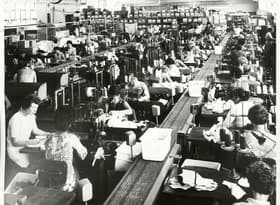Darker times give food for thought on poverty
Darker times give food for thought on poverty
I recently saw the movie Amazing Grace. It’s a powerful, albeit Hollywood-style, retelling of the life of William Wilberforce – the British politician who was instrumental in abolishing the slave trade throughout the British Empire. It’s the sort of movie that can make you pat yourself on the back and be pleased with how far society has come. But when future generations look back on us, it’s sobering to think they might judge us in the same light.
Public opinion in Britain was reportedly largely against slavery by the time the Slave Trade Act 1807, the first major step towards abolition, was passed. But slavery had existed around the world for centuries before this act, and continues to this day in many forms around the world despite its illegality. It is clear that in Wilberforce’s time, support for state-sanctioned slavery went far beyond a few morally bankrupt traders and vested interests. Some people must have honestly believed that if you were born into slavery it was your number, and if you were sold into slavery it was your misfortune.
It is likely that ignorance and apathy also played a role in keeping the trade going for so long. With the way 18th century Britain is portrayed in the movie Amazing Grace, you get the sense that there was an "out of sight, out of mind" mentality prevalent amongst some of the general public. The worst human rights violations were committed in other countries, on the slave ships, or at the sugarcane plantations. Indeed, despite its portrayal in the film, by the later 1700’s domestic slavery was rare in Britain as its legal status had been successfully challenged in the courts. This separation may have made the debate back in Britain largely academic, concerning what (if any) basic human rights were universal.
It is clear that some simply saw slavery as a necessary evil. The United States was no exception, with Thomas Jefferson observing in a letter on slavery in 1820: "But, as it is, we have the wolf by the ear, and we can neither hold him, nor safely let him go. Justice is in one scale, and self-preservation in the other."
Economic arguments for keeping the trade going seemed compelling. At its peak, as much as 80% of Great Britain's foreign income depending on trading in slave-produced goods such as sugar. But the economic justification for slavery falls apart when the issue is examined in a dynamic sense. Although slavery feathered the nests of plantation owners and farmers, it hampered economic growth because there was little incentive to invest in machinery and technological development while labour costs were artificially low.
Can we really compare such blatant disregard for human rights to our present day society? If state-sanctioned slavery was the humanitarian issue of the 18th and 19th centuries, surely for the 21st century it is third-world poverty.
As a technological optimist, I believe that third-world poverty will continue to fall over the next 50 years. Many of the lesser-developed countries in Asia have been undergoing their own growth miracles over the last two decades. The result has been millions lifted out of poverty and into a middle-class lifestyle. But the developed world’s love of trade protectionism has slowed this process considerably.
The USA and European governments pay massive subsidies to their own farmers to produce food that competes with food grown in the developing world – keeping the world price artificially low and the domestic price artificially high. While these policies feather the nests of the farmers they are bad for domestic consumers, who pay higher prices, and for third-world farmers who aren’t allowed to sell their produce at true market prices.
The billions of dollars in aid and charity that we send to underdeveloped areas of the world seems like a contradiction if we aren’t willing to trade with these communities.
We are also suspicious of letting foreign nationals come and work in our economy, lest they steal jobs from our citizens. Again these attitudes are based on a static view of the economy, rather than a dynamic view that recognises the fact that the supply of jobs is not fixed.
In the movie Amazing Grace, there were those who refused to take sugar in their tea as a sign of protest against slavery. The movie’s writers seem to make light of this gesture, as it appears fairly meaningless in the face of what was going on.
Today we drink fair-trade coffee with the best of intentions. While I’m not diminishing the value of schemes like fair-trade, they don’t go nearly far enough. If the developed world was committed to the plight of the world’s poorest, it would abandon the short-sighted trade protectionism that appears to be coming back into favour.










